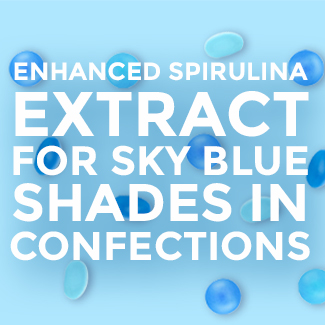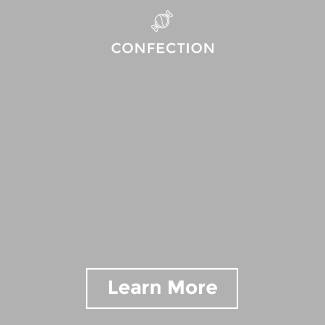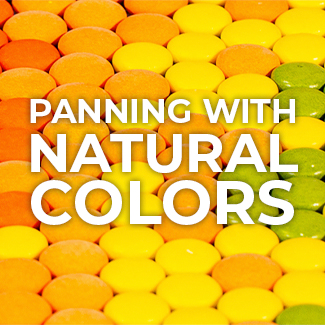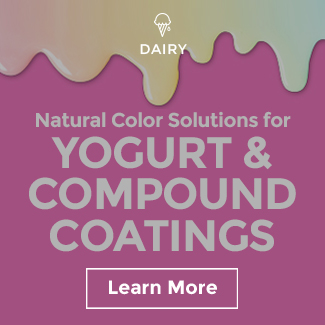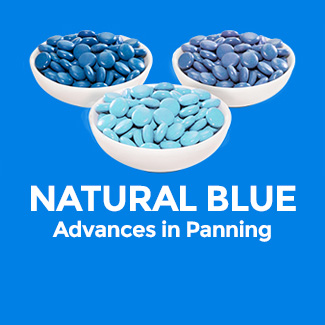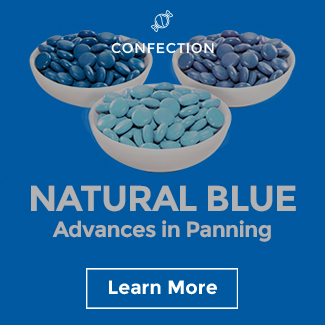Unleashing Nature’s Rainbow for Panned Confection Applications
Color Advancements and Cost Optimizations Enable Innovation—Naturally!
While consumer concerns around artificial ingredients like synthetic colors continue to fuel demand for clean-label, naturally colored confections, the rapidly evolving food color landscape equips product developers to respond with next-generation, high-performing, and cost-effective natural colors.
This blog focuses on some of Sensient’s ground-breaking natural color advancements for panned confections, but in a previous blog, I discussed some helpful technical considerations for panned developers to keep in mind when formulating with natural colors.
On a relative basis, natural colors are more expensive than synthetic, but compared to the value they deliver for the brand they’re still relatively cost-effective and typically still much less expensive than the cocoa and other ingredients that go into panned confections.
Unleashing the Power of Nature
With many years of work in the confection space, Sensient’s R&D team has unleashed many natural innovations, providing a wider rainbow of shade options at better cost-in-use than ever before. Optimized botanical sources and natural color solutions that concentrate natural colors will allow much lower usage rates and can also result in cost savings in certain instances. More importantly, these solutions will work better in the panning application, which offers other processing advantages. For your convenience, Sensient also offers sugar-based natural color dispersions to enable more seamless color application with your existing process.
There’s never been a better time to consider natural color conversion or innovation in the panned confection space.
WHITE
White is an important color for panned confections, often used as a base coat to provide a bright, consistent foundation for added colors. Titanium dioxide is a very stable, bright white colorant, but recent pushback from non-governmental organizations (NGOs) and other food activists has pushed many brands to seek alternatives. With France’s ban on titanium dioxide going into effect on January 1, 2020, we’ve seen a flurry of confectionery manufacturers replacing the additive in order to remain compliant.
For panned confections, the approval of calcium carbonate by the FDA and Health Canada as a color additive is an exciting option. Since its approval, Sensient’s confection color experts have transformed a standard calcium carbonate color solution into a highly-effective, optimized offering with ultra-fine versions available for better mouthfeel and improved taste profile. We have optimized this colorant with ultra-fine versions available to offer a better-performing solution than industry-standard calcium carbonate; with better mouthfeel and an improved overall taste profile. In panning, calcium carbonate is an interesting option for countries where it is permitted. However, in Brazil its use is not allowed for this application.
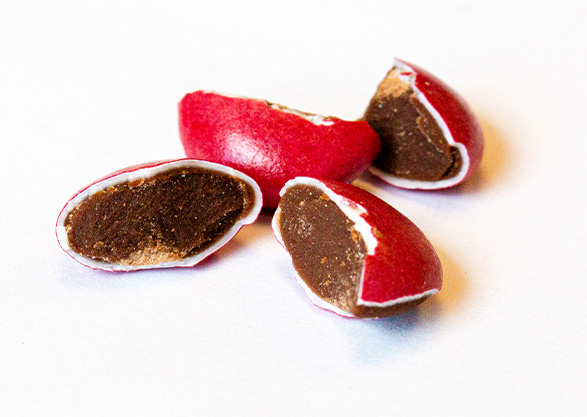
For a clean-label opacifying and whitening option, Avalanche™ solutions have been designed to best match the performance and processes of titanium dioxide and provides enhanced performance and lower usage rates compared to other alternatives. This portfolio is the industry’s only global suite of simple ingredient starch and mineral-based solutions, addressing clean ingredient needs and making product innovation easy for brands.
RED
Anthocyanins are more stable in low-water panning applications and provide a range of shades, including red. Under certain pH conditions, red anthocyanins can shift to purplish shades during processing.
Beet provides pink and red shades in panned applications, but browning and color degradation can occur under heat. Beet is one of the key botanicals in focus for Sensient’s agronomists to improve cost over time, increasing cost-effectiveness for our customers.
Beta Carotenes can also present in the coral to red range with excellent stability.
Red Iron Oxide functions like a pigment, providing a heat-, light-, and pH-stable rich red source and they are highly cost-effective. We offer the purest grade of iron oxides—pharmaceutical grade—which provide lower iron levels than industrial iron oxides for a cleaner profile. However, it is not intended for use in this application in Brazil.
Carmine is a stable, cost-effective option for magentas, and Sensient’s recent vertical integration in Peru enables us to offer greater supply and cost stability for this colorant to our customers.
Certain botanical color sources like some red radishes are not suitable for panned applications due to inherited flavor off-notes. Pure-S™ Red is Sensient’s proprietary gentle purification technology, removing unwanted flavor profiles associated with the original color source to enable the use of nature’s most vibrant shades.
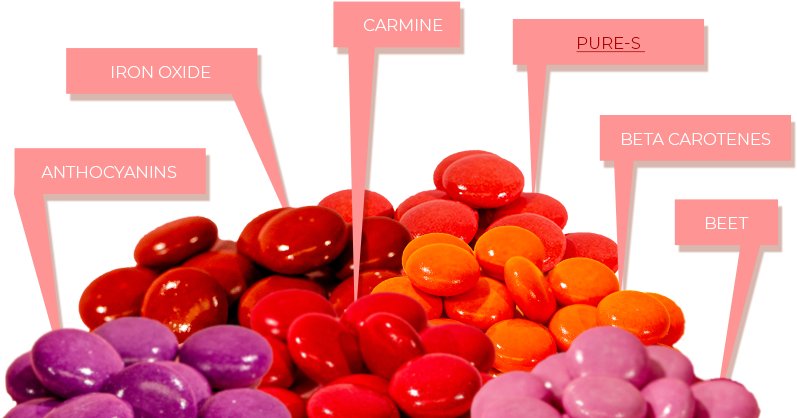
ORANGE
Paprika opens the door to deep reddish-orange shades for panned developers. While paprika does carry flavor off-notes, there’s no need to worry. As you can see, developers can achieve brilliant orange shades more efficiently through other options.
Orange shades can also be achieved with a blend of our pharmaceutical-grade iron oxides. Iron oxides are generally the most cost-effective alternative to FD&C colors. Iron oxides are generally the most economical alternative, allowed in the United States, but not allowed in Brazil.
Beta Carotenes can range from golden to orange with excellent stability. Nature-identical Beta Carotene also offers a cost-effective alternative.
For a wider range of orange shades, color experts like Sensient’s panned application technologists can create unique blends of red and yellow natural colors into a combined delivery system.
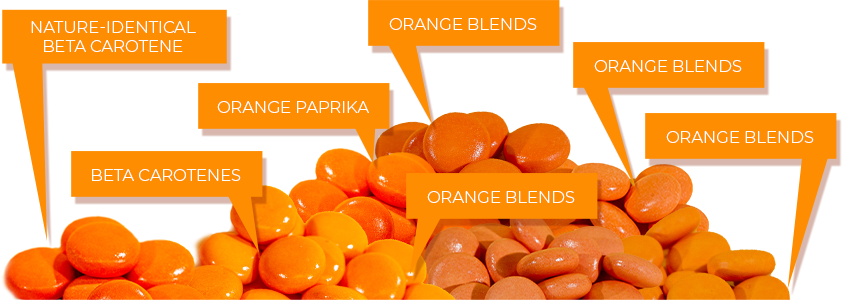
YELLOW
Riboflavin can impart off-notes, but it gives extremely stable shades similar to yellow iron oxide.
Sensient’s pharmaceutical-grade Yellow Iron Oxide provides an extremely stable and cost-effective mustard yellow shade. However, in Brazil this is not permitted.
Beta Carotenes in golden-yellow tones are highly stable.
Turmeric is extremely cost-effective and heat-stable, imparting a bright yellow shade very similar to FD&C Yellow #5, but it may face issues of light stability. This is less challenging in panned confections than other applications. Sensient’s agronomists are continuously working to decrease the cost of turmeric over time.
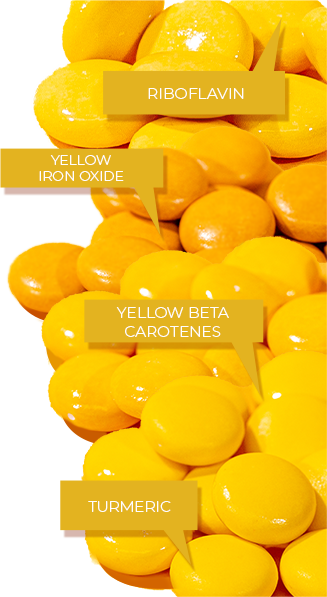
BLUE
Blue has been a historically difficult shade to reach with natural colors. pH-modified anthocyanins provide consistent shade performance and denim blue shades in panned applications.
Sensient’s proprietary Natural Blue vegetable juice provides a heat- and light-stable periwinkle blue shade in panned applications, widening the natural crayon box. Through seed breeding to improve pigment concentration, Sensient’s agronomy team has improved cost-in-use for this botanical.
Spirulina provides bright sky-blue shades, but it struggles with heat stability and low-pH environments. Sensient has achieved cost improvements in our Spirulina portfolio due to supply chain partnerships, which drive efficiencies and increased yields.
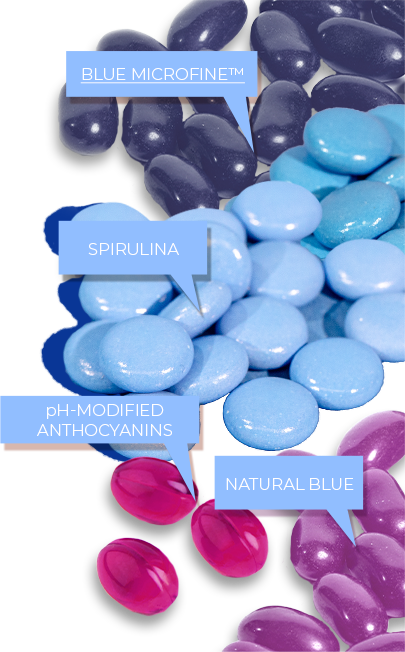
GREEN
Because green is often a combination of limited natural blues with natural yellow sources, these shades can be limited as well.
Blends of Natural Blue vegetable juice or Spirulina with Turmeric or Beta Carotene create a range of botanically-sourced natural green shades. Constant improvements in the growing and processing of Spirulina, Turmeric, and other color crops are making green blends more cost-effective. We also have copper chlorophyllin for a natural green hue.
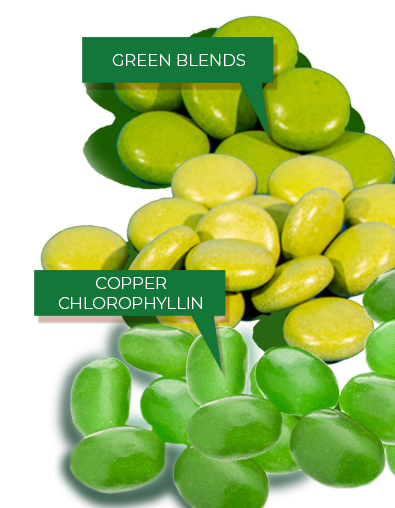
PURPLE
Anthocyanins can provide deeper, cooler purple shades at pH 4.0-6.0.
Sensient’s proprietary Natural Blue vegetable juice provides a heat- and light-stable royal purple shade at lower pHs.
If increased heat stability or enhanced betanin concentration is needed for specific processing, SupraRed™ is a heat-stable, beet-based natural color technology providing purple-blue shades when panned.
Blue Carmine behaves like a stable pigment and provides vibrant violet shades in panned confections, and Sensient’s vertical integration ensures a consistent, stable, cost-effective supply.
An even wider range of purple hues can also be created with blends of natural red sources with natural blues in a single delivery system, allowing for clean fruit and vegetable juice labels and more precise shade targets.
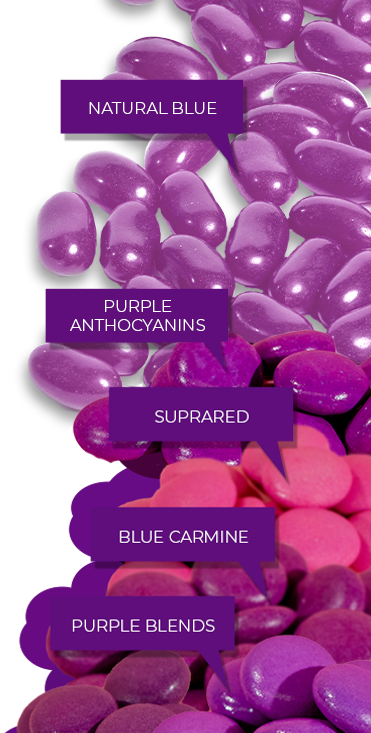
BROWN
Caramel coloring provides a spectrum of brown hues from Class I to IV. However, Caramel is in the middle of major discussions by regulatory groups around the world to ban or impose restrictions.
To reach specific shades, natural browns can also be achieved with blends of natural reds, blues, and yellows in a single delivery system.
For those seeking caramel alternatives for brown, Sensient’s Sienna™ blends offer a cost-effective natural brown from fruit juice, delivering buttery yellow-browns to deep amber browns to dark coffee shades.

BLACK
Sensient’s Black Iron Oxide is extremely high purity and functions like a pigment, delivering stable, strong black shades with lower iron levels than industry-standard iron oxides for a cleaner label. However, this is not permitted in Brazil for confections.
For a botanically-sourced solution, natural blacks can also be achieved with blends of natural reds, blues, and yellows in a single delivery system.
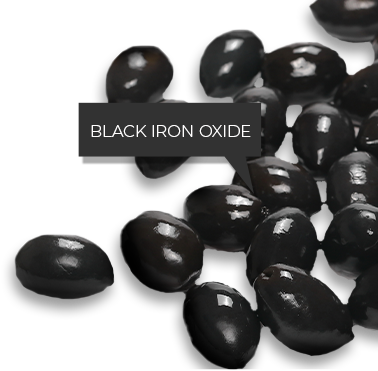
INCLUSIONS
An exciting inclusion that can easily be applied to panned confections without capital investment is SpectraFlecks™. These colored film particulates add bursts of color and can even be in specific shapes, like stars for a seasonal release.
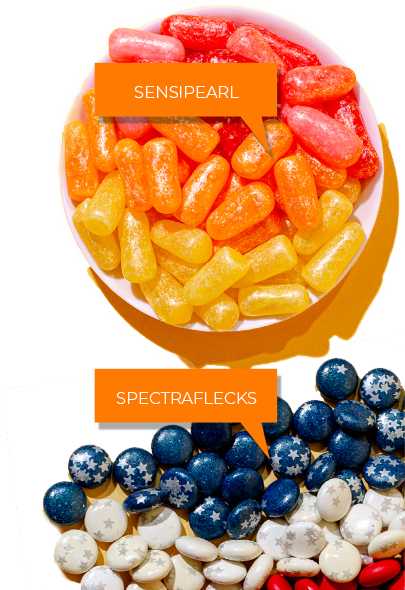

Get started fast with a sample request! If you need a little more personalized guidance, feel free to schedule a consultation—my team and I love to talk color.









